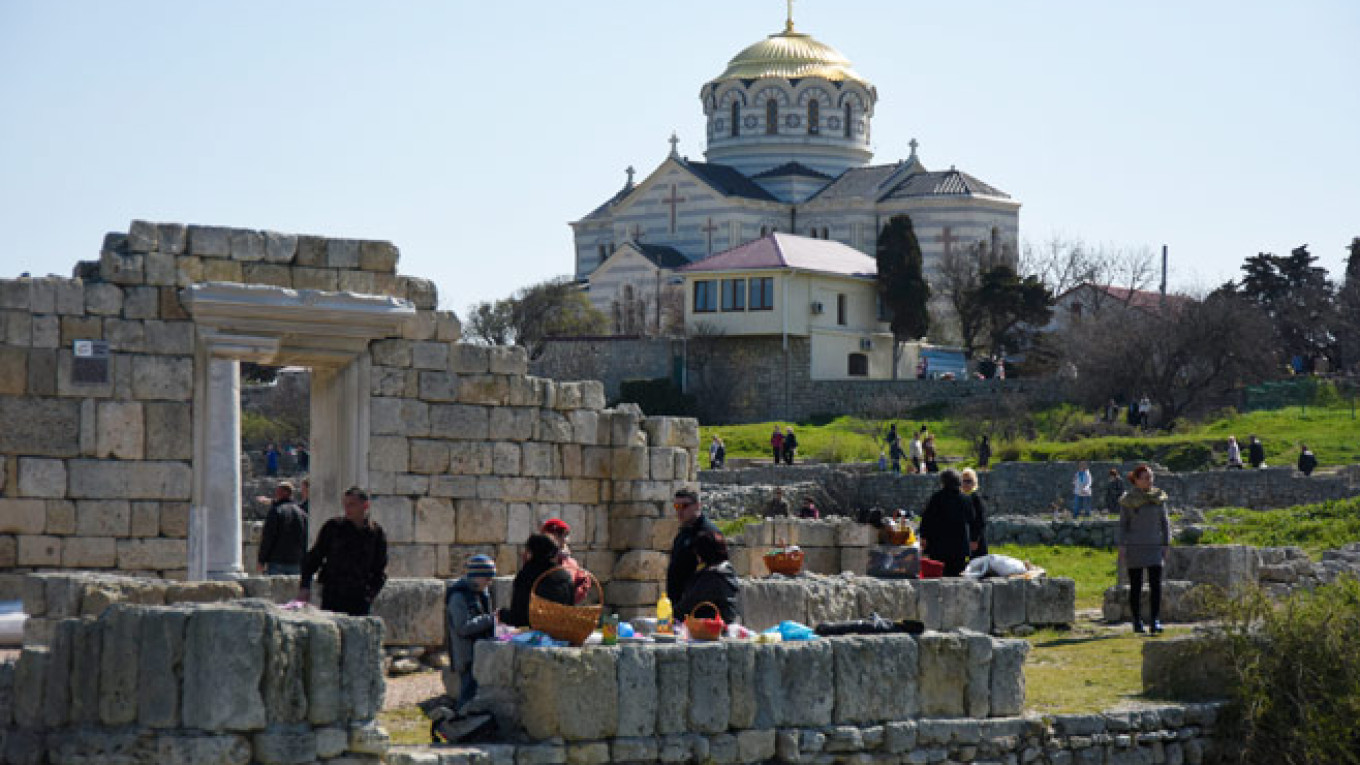Employees working at the historic site of Chersonesus on the Crimean Peninsula have said they will not work under an Orthodox priest appointed director last week as a battle over the leadership of the UNESCO-protected national park intensifies.
Local governor Sergei Menyailo introduced archpriest Sergei Khalyuta to staff as the new head of the ancient archaeological site Thursday in a meeting that descended into an angry shouting match.
A total of 106 staff members at Chersonesus said in a resolution adopted Monday evening that they “distrust” Khalyuta and will “refuse to work under his leadership,” according to a copy of the document posted on the national park’s website.
The fight over control of Chersonesus, located on the outskirts of the port of Sevastopol in the Crimean Peninsula annexed by Russia from Ukraine last year, reflects opposition to the growing power of the Church in Russian public life and highlights a battle for the country’s historical record as official narratives promote a more patriotic, Orthodox-focused strain of history.
‘Russian Athos’
Menyailo, a former commander of the Russian Black Sea Fleet, said that he would like to change the orientation of Chersonesus, which includes the remains of an ancient Greek settlement dating from 5000 B.C., to have more of a religious focus.
“New opportunities will open up for developing the national park as a pilgrimage center and a platform for a dialogue between secular and Orthodox culture,” Menyailo said Monday, according to local news website Crimea News. “The appointment of Father Sergei will allow us to organize a Russian Athos on Crimean soil,” he added, referring to Greece’s famous Mount Athos monastery.
Chersonesus is an important site for the Russian Orthodox Church because it marks the spot where Prince Vladimir, the 10th-century founder of the modern Russian state, was baptized by Byzantine clerics.
Crimea has become an international flash point since it was seized from Ukraine by Russian troops last year after a pro-Western government swept to power in Kiev on the back of street demonstrations.
As relations have deteriorated between Russia and Ukraine, both countries are seeking to stake their claim to the historical legacy of Prince Vladimir — a competition that was put starkly on display during celebrations of 1,000 years since Prince Vladimir’s death in Moscow and Kiev last month.
In his 2014 state-of-the-nation address, Russian President Vladimir Putin said that Chersonesus was as significant for the Russian people as the Temple Mount in Jerusalem was for Jews and Muslims.
Ancient History
Anna Kornilova, a spokesperson for the Chersonesus national park, said Tuesday that staff feared the new religious direction would mean some aspects of Chersonesus’ history would be jettisoned.
Founded by the Greeks in the 5th century B.C., Chersonesus was a Black Sea exchange hub for the Roman, Greek and Byzantine empires and was inhabited continuously for almost 6,500 years. The site covers some 500 hectares, containing Stone Age as well as early Christian monuments.
In 2013, UNESCO made Chersonesus a World Heritage Site, stressing its Greek origins and unique accumulation of ruins from different historical periods.
“The Church is propagandizing Byzantium and the baptism of Vladimir … the Greek legacy of Chersonesus will be forgotten,” said Kornilova, the site’s spokeswoman. “For academics, it’s a catastrophe.”
The new director, Khalyuta, does not have an academic background and has been criticized as underqualified for the position. Khalyuta reportedly completed a course at a medical technical college in his youth, but does not have a degree from a higher education institution.
Moscow Intervenes
Khalyuta’s appointment, and the abrupt removal of former director Andrei Kulagin, provoked criticism from senior cultural figures in Russia.
The director of St. Petersburg’s world-famous State Hermitage Museum, Mikhail Piotrovsky, called the decision a “provocation.” Some local figures, including prominent businessman Alexei Chaly, the leader of the pro-Russian separatist movement in Sevastopol in early 2014, also said the appointment should be reversed.
The move even drew the ire of the Culture Ministry — despite governor Menyailo’s assertion that he had approved the appointment in advance with Culture Minister Vladimir Medinsky.
Vladimir Tolstoi, a cultural adviser to the president and a descendant of writer Leo Tolstoy, described the decision last week as “hurried, insufficiently thought-through and … mistaken,” according to Russian news agency RIA Novosti.
On Saturday, as a result of the uproar, Putin ordered Chersonesus to be placed under federal control — removing it from the control of local officials — in a fast-tracked process due to be completed by Sept. 1.
Chersonesus spokeswoman Kornilova said staff at the national park were hoping that the transfer to federal ownership means that a new director will be appointed — or the old director reinstated — on the orders of the Culture Ministry in Moscow within a month.
Contact the author at h.amos@imedia.ru
A Message from The Moscow Times:
Dear readers,
We are facing unprecedented challenges. Russia's Prosecutor General's Office has designated The Moscow Times as an "undesirable" organization, criminalizing our work and putting our staff at risk of prosecution. This follows our earlier unjust labeling as a "foreign agent."
These actions are direct attempts to silence independent journalism in Russia. The authorities claim our work "discredits the decisions of the Russian leadership." We see things differently: we strive to provide accurate, unbiased reporting on Russia.
We, the journalists of The Moscow Times, refuse to be silenced. But to continue our work, we need your help.
Your support, no matter how small, makes a world of difference. If you can, please support us monthly starting from just $2. It's quick to set up, and every contribution makes a significant impact.
By supporting The Moscow Times, you're defending open, independent journalism in the face of repression. Thank you for standing with us.
Remind me later.


